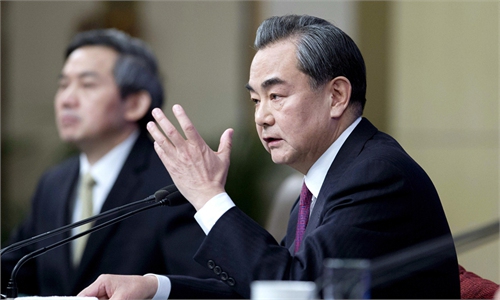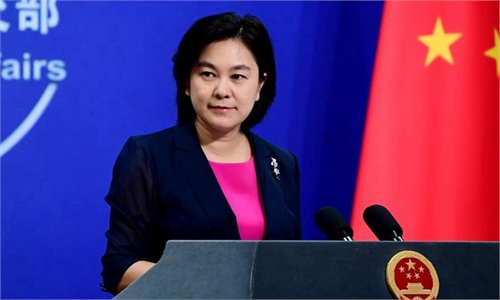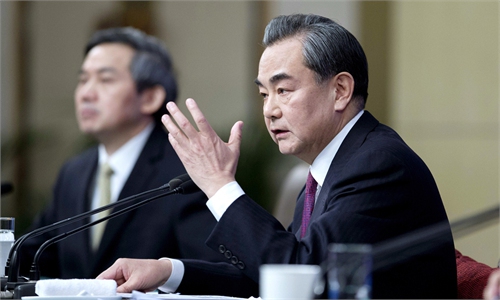ASEAN leaders agree on ending Myanmar violence; meeting believed to put brakes on escalating tension

Leaders of the Association of Southeast Asian Nations (ASEAN) meet to discuss the ongoing situation in Myanmar, at the ASEAN Secretariat Building in Jakarta on Saturday. Photo: VCG
The Association of Southeast Asian Nations (ASEAN) agreed on a five-point consensus on Saturday regarding the Myanmar crisis in a special meeting attended by heads of state and the Myanmar military. The consensus urged an end to violence and called for constructive dialogue among all parties concerned, which ASEAN regarded as "beyond expectations."
Experts noted that the consensus will effectively promote the de-escalation of the Myanmar situation, and ASEAN's taking the initiative in the matter as "the most proper and justifiable body" would avert intervention by the West.
Chinese State Councilor and Foreign Minister Wang Yi on Thursday commented on the talks, calling them "timely and important," during his telephone conversations with the leaders of Thailand and Brunei.
The emergency gathering, which was attended by Myanmar military leader Min Aung Hlaing and six heads of state, as well as three foreign ministers representing ASEAN, was the first in-person meeting among ASEAN members since the initial COVID-19 outbreak, and it was also the first coordinated international effort to ease the crisis in Myanmar.
It was also the first time for Min Aung Hlaing to leave his country after the major cabinet reshuffle that took place in February.
According to the statement rolled out after the meeting, ASEAN agreed on an "immediate cessation of violence" and sought a peaceful solution in the interests of the Myanmar people through constructive dialogue.
A special envoy of the ASEAN Chair will also be sent to Myanmar to facilitate the process, and will meet with all parties concerned, read the statement, adding that humanitarian assistance will be provided to Myanmar.
Although there was no immediate comment from Min Aung Hlaing, Malaysian Prime Minister Muhyiddin Yassin said that Min Aung Hlaing "did not reject what was put forward by me and many other colleagues," and the talks were "beyond our expectations," reported Reuters.
Chinese experts believed that the five-point consensus will be conducive to the easing of the Myanmar situation, and they have helped to create a friendly environment for future dialogue, but the key to settling the problem lies in the implementation of the consensus.
Bi Shihong, a professor at the Center for China's Neighbor Diplomacy Studies and School of International Studies of Yunnan University, told the Global Times on Sunday that the consensus "will to some extent nudge the Myanmar military to accept the suggestion from ASEAN, if not for intervention by Western powers through means of increasing sanctions or inciting protests."
That the statement steered away from mentioning the release of the detained leaders also showed that there might be divisions among ASEAN members over how to handle the internal affairs in Myanmar, Bi said, noting that some countries might communicate on the matter individually with the Myanmar military through a bilateral mechanism.
There is the possibility that Min Aung Hlaing might respond to such demands, if the situation in Myanmar can reach a smooth transition, Bi noted.
The talks between ASEAN and the Myanmar military came at a time when both sides have felt increasingly the urgency to stop the turmoil immediately, Xu Liping, director of the Center for Southeast Asian Studies at the Chinese Academy of Social Sciences in Beijing, told the Global Times on Sunday.
"For ASEAN, the situation in Myanmar has been deteriorating since February, and the turbulence has exceeded its expectations. They realized that dialogue should be conducted to prevent it from getting out of hand," noted Xu.
"For the Myanmar military, the domestic situation is deadlocked. If the suppression continues, public protests will likely get out of control. Therefore, they need external forces to resolve the predicament," Xu said.
The practical need for humanitarian aid from ASEAN is also a contributing factor, added Xu, as Myanmar faces a multi-faceted economic, social and even food crisis.
China expects the ASEAN meeting to contribute to promoting political reconciliation in Myanmar, showing ASEAN's constructive role, and fending off external interference, Wang Yi noted, while warning that the "wanton suppression of external forces" would bring turbulence to the Myanmar situation and disrupt regional stability.
Wang urged the international community to take an objective and impartial approach to relieve the tense situation in Myanmar, instead of doing the opposite.
"The international community should jointly support ASEAN to play its due role in this aspect," stressed Wang.
Xu called ASEAN the "most proper and justifiable body" to be engaging in the matter, as Myanmar is a member state of ASEAN, and it thus must abide by the organization's Charter, which grants ASEAN legitimacy to negotiate.
"Compared with Southeast Asian countries, the West has little interest in Myanmar's upheaval, and its interference is mixed with geopolitical aims that would only complicate the current status," Xu said.
Bi believed that ASEAN is playing a more powerful role in dealing with the situation in Myanmar than other international organizations such as the UN Security Council.
Bi noted that as a regional organization that Myanmar heavily relies on, ASEAN has richer experience in dealing with such problems, and its members have deeper understanding of how such domestic chaos will affect regional stability and development.



